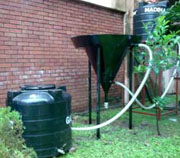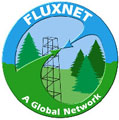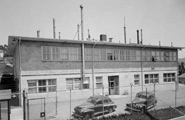


One in five deaths in Bangladesh is caused by drinking water contaminated with arsenic, according to a study published recently in the medical journal The Lancet by an international team of researchers. The study's publication has generated renewed public interest in finding a quick, cost-effective solution to a problem that is turning into a human catastrophe. Ashok Gadgil, Acting Director of the Environmental Energy Technologies Division, has developed two low-cost arsenic-removal technologies that have proven effective in lab studies, ECAR (ElectroChemical Arsenic Remediation) and ARUBA (Arsenic Removal Using Bottom Ash) (pictured). Working with Gadgil, guest researcher Susan Addy is developing programs and partnerships to implement the technologies. Read an article here and learn more about the technologies here.
 The second of five Carbon Smackdown matches takes place Friday at noon in the Building 50 Auditorium. Grab your lunch and learn how Berkeley Lab scientists are exploring ways fight climate change by capturing carbon from the flue gas of power plants, as well as directly from the air. Jeff Long of the Materials Sciences Division and Nancy Brown of the Environmental Energy Technologies Division will discuss the promise and future of carbon capture research. They’ll also answer your questions. Can’t leave your desk at noon? We’ve got you covered with a live webcast. Check out the complete line-up of matches pitting Berkeley Lab scientists against carbon dioxide.
The second of five Carbon Smackdown matches takes place Friday at noon in the Building 50 Auditorium. Grab your lunch and learn how Berkeley Lab scientists are exploring ways fight climate change by capturing carbon from the flue gas of power plants, as well as directly from the air. Jeff Long of the Materials Sciences Division and Nancy Brown of the Environmental Energy Technologies Division will discuss the promise and future of carbon capture research. They’ll also answer your questions. Can’t leave your desk at noon? We’ve got you covered with a live webcast. Check out the complete line-up of matches pitting Berkeley Lab scientists against carbon dioxide.
 Nigel Quinn of the Earth Sciences Division has been selected as a Fellow of the International Environmental Modeling and Software Society. Quinn’s research focuses on the development of environmental decision-support systems to help solve water and water-related management problems in California and worldwide. He serves as Chair of the Central Valley Salinity Coalition’s Technical Advisory, Economic and Policy Committee, which guides the Central Valley Water Board, the State Water Board, agricultural, municipal and industrial stakeholders in addressing salinity and nitrate problems in California’s Central Valley and finding long-term solutions that will lead to enhanced water quality and economic sustainability. He will be inducted at the society's annual meeting in Ottawa, Canada in July.
Nigel Quinn of the Earth Sciences Division has been selected as a Fellow of the International Environmental Modeling and Software Society. Quinn’s research focuses on the development of environmental decision-support systems to help solve water and water-related management problems in California and worldwide. He serves as Chair of the Central Valley Salinity Coalition’s Technical Advisory, Economic and Policy Committee, which guides the Central Valley Water Board, the State Water Board, agricultural, municipal and industrial stakeholders in addressing salinity and nitrate problems in California’s Central Valley and finding long-term solutions that will lead to enhanced water quality and economic sustainability. He will be inducted at the society's annual meeting in Ottawa, Canada in July.
 Computing: FLUXNET Helps Provide Insights Into Global Carbon Cycle
Computing: FLUXNET Helps Provide Insights Into Global Carbon Cycle Environmental researchers around the globe can share and analyze FLUXNET field-data through an online collaboration portal called fluxdata.org, which was developed with the Berkeley Water Center by a team of researchers and computer scientists from the Berkeley Lab’s Advanced Computing for Science Department (ACS), UC Berkeley, Microsoft Research and the University of Virginia. FLUXNET is an international data collaboration that coordinates regional and global observations from micrometeorological tower sites that measure the exchanges of carbon, water vapor, and energy between terrestrial ecosystems and the atmosphere. Two research teams that have reaped the benefits of this architecture will see their findings published in the journal Science. The papers are “Terrestrial Gross Carbon Dioxide Uptake: Global Distribution and Co-variation with Climate” and “Global Convergence in the Temperature Sensitivity of Respiration at Ecosystem Level.” More>
 Facilities: Sampling Activities for Pre-Demolition of Old Town
Facilities: Sampling Activities for Pre-Demolition of Old Town Starting tomorrow and continuing through the first week of August, pre-demolition activities in the Old Town area of the Lab will commence. The activities will consist primarily of taking samples from various components of the existing buildings to determine if they are contaminated or hazardous. This information is needed so that the buildings may be carefully and safely decontaminated and abated before any “hard” demolition takes place later this calendar year. Parking and traffic control measures will be in place, but access on some roads will be temporarily disrupted during this time. For more information, contact Ted Mankowski (x2012).
Online training on using Point and Ship, the Lab's new electronic shipping system, is available tomorrow at 10 a.m., Friday at 3 p.m., next Tuesday (July 13) at 9 a.m., and Thursday (July 15) at 3 p.m. To register for one of these webinars, e-mail your preferred date here.
Starting July 1, there were changes in the toll prices for Bay Area bridges. Rate changes differ by time of day and number of occupants per vehicle. To view details of this new plan, visit the Bay Area Toll Authority website. Commuters can save significantly by carpooling. For information on finding a carpool partner, check out the Lab’s private rideshare network, Zimride. The program is a fun way to save money, help the environment, and meet new co-workers.
Today
at Berkeley Lab encourages feedback and story ideas
Deadline for submissions is 10 a.m. two days prior to publication
TABL is produced by Public Affairs' Communications Group